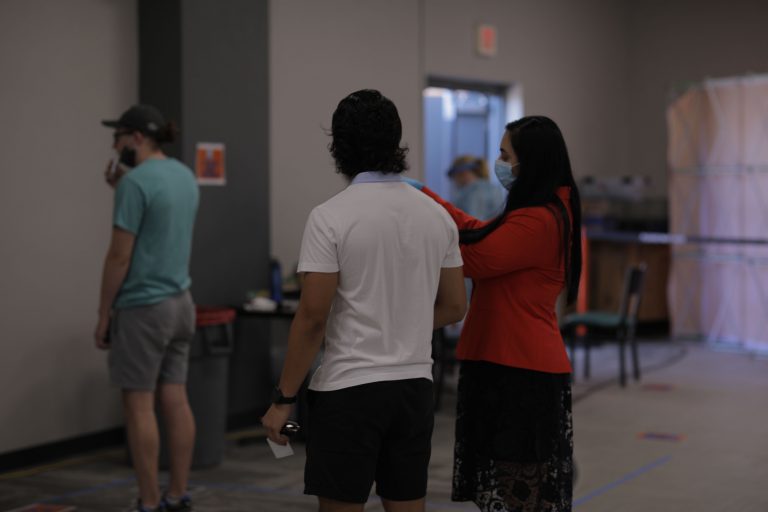GREENVILLE – About 10% of undergraduates at Greenville University in southern Illinois contracted COVID-19 this semester, according to data from the campus. The small private Christian college located about 50 miles east of St. Louis used the University of Illinois COVID-19 Shield program during the fall semester.
President of Greenville University, Suzanne Davis, says thanks to the U of I’s saliva test, the campus was a relatively safe haven from the coronavirus. Greenville serves about 700 undergrads, and of the 648 who were tested for the virus over the course of the semester, 64 contracted COVID-19, according to data provided by the university.
“We said this often throughout the semester that we’re one of the safest campuses that you can be on in the world,” she says. “I mean, as far as we can tell.”
U of I epidemiologist Becky Smith agrees, saying “if you have the testing program in place, so you can find those cases quickly — especially in a small population — it’s possible to limit the spread very quickly.”
Students at Greenville were expected to test twice a week for the majority of the semester, and the samples were sent back to Urbana to be processed by U of I labs. Each test costs between $20 and $30, according to U of I officials. Davis says the small college expects to pay about $500,000 to test its students over the course of the academic year.
Smith says she had hoped there would be fewer cases of the virus on the Greenville campus due to its size and close knit community. Data from the campus shows that commuter students made up about 30% of undergrads who contracted the virus, even though they only account for 13% of undergrads tested.
A spokesperson for Greenville, Terri Sunderland, says the majority of commuter students live with family members, are living, working and going to school in the broader community. She says they also weren’t as tested as frequently as those living on campus.
“The majority of our commuters who were positive believed they contracted COVID either from those in their household or from non-GU related locations (church, workplace, etc.),” Sunderland wrote.
She says students who live on university premises are both tested frequently and more isolated from the broader community outside campus.
“Our local community saw a dramatic increase in COVID cases throughout the course of the semester, and with that came an increase in the positives among our commuters,” Sunderland wrote.
Davis says 98% of students who lived on campus adhered to COVID-19 rules. She says that’s due to the size of the campus, the messaging provided to students at the beginning of the semester, and the culture of the school.
“We didn’t really have as many issues as you would think because we framed this — and our student government did a great job of framing this — as an expectation of being a Greenville University student that is someone of Christ-like character and service,” Davis says.
Smith says the success of the Shield program on the Greenville campus — and the U of I campus — illustrates that it works on both a large and very small scale.
“So, if nothing else, this program works given the circumstances we’re in. What I’d love to see is it spread wider, so that we can see what will happen if Shield is not just on campus” Smith says.
She says the U of I is working as hard as possible to expand the Shield program. But those efforts have been hampered by a lack of approval from the federal government. U of I officials said during a hearing hosted by a state Senate committee this week that their saliva test needs emergency use authorization from the U.S. Food and Drug Administration or an executive order from the governor to expand its use within Illinois.
Researchers at the university say the test is in the final stages of a clinical trial required for FDA authorization.
Davis says Greenville will use the test in the spring, and she says she’d implement a similar program if another pandemic emerged in the future.
A small liberal arts college like Greenville, however, doesn’t have the resources required to create a test for a novel virus. Smith says that’s why it’s advantageous for small schools and large research institutions to collaborate.
“I personally feel like we gain more from being open and sharing and working together than we would lose as far as sharing what we have,” Smith says.
Lee Gaines is a reporter for Illinois Public Media.
Follow Lee Gaines on Twitter: @LeeGaines

